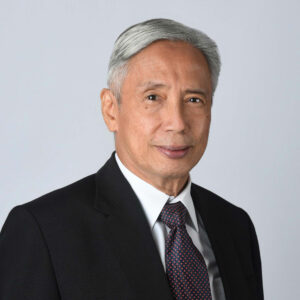Medalla signals gradual tightening

FELIPE M. MEDALLA / COURTESY OF BANGKO SENTRAL NG PILIPINAS
THE PHILIPPINE central bank is likely to raise its key interest rate at its next two meetings to curb inflation, but the pace of subsequent tightening will be gradual as its incoming chief ruled out hikes bigger than 25 basis points (bps).
“We have already signaled that it’s a sure thing that we will raise policy rates next week (June 23) and that we’ll likely to follow that up with a policy rate increase by August,” incoming Bangko Sentral ng Pilipinas (BSP) Governor Felipe M. Medalla said during a virtual roundtable discussion with BusinessWorld editors on Tuesday.
Mr. Medalla, who is currently a member of the Monetary Board and will serve the remaining term of BSP Governor Benjamin E. Diokno starting July 1, said any rate hikes after the Aug. 18 meeting will be data dependent.
“Depending on the data, it can be four or five more. Depending on the data, some more in 2023,” he added.
There are five more Monetary Board meetings scheduled this year — June 23, Aug. 18, Sept. 22, Nov. 11, and Dec. 15.
Asked if the BSP will consider rate hikes above 25 bps, he said: “Personally, I do not like 50 basis points. It signifies that we know something bad that you don’t know. It could be misread, as ‘wow, what does the central bank know that we don’t know?’”
Mr. Medalla said the BSP still has the “luxury of time and large reserves.”
“If the markets think we’re behind the curve, they will attack the peso,” he said. “Fortunately, the need to look more hawkish than we should be is not there. Right now, we’re trying to balance to ensure that we don’t miss our inflation targets next year, given the supply shocks.”
The Monetary Board kicked off its tightening cycle by raising the policy rate, the yield on the BSP’s overnight reverse repurchase facility, by 25 bps to 2.25% during its May 19 meeting to temper rising inflation. Interest rates on the overnight deposit and lending facilities were also hiked to 1.75% and 2.75%, respectively.
This was the first increase in borrowing costs since 2018 and followed cuts worth 200 bps in 2020 as the BSP moved to support the economy amid the coronavirus pandemic.
Inflation accelerated by 5.4% in May, the highest in three and a half years and above the BSP’s 2-4% target range.
The BSP last month raised its average inflation estimate to 4.6% this year, higher than the previous estimate of 4.3%. In 2023, inflation is projected at 3.9%, also higher than the previous estimate of 3.3%.
“(Based on) our calculation the probability it will exceed target of 2-4% next year is 47%, then that’s unacceptable. We are an inflation-targeting central bank. We cannot cure what has already happened, the price shocks… (But) we will do our best (to ensure) that demand is not excessive and inflationary expectations are not disanchored,” Mr. Medalla said.
Mr. Medalla also downplayed concerns that policy tightening will dampen the Philippine economy’s recovery from the pandemic.
“Now the question is will it kill growth? My answer is no. Because when your expected inflation is higher than 3% and policy rate is below 3%, in real terms that’s still very low interest rates,” he said.
Economic managers are targeting a 7-8% gross domestic product (GDP) growth this year.
“2022 will be a high-growth year, simply because of the huge pent-up demand. What’s going on in the Philippines is the relaxation of all those restrictions in people’s movements is more powerful than any stimulus you could think of,” Mr. Medalla said.
Most regions in the Philippines have been under the most relaxed coronavirus alert level since March.
However, health experts have warned daily coronavirus infections in Metro Manila and nearby areas can hit as much as 500 by the end of June.
The full video of the roundtable with Mr. Medalla will be shown on BusinessWorld’s Facebook page at 11 a.m. on June 20. — Keisha B. Ta-asan




